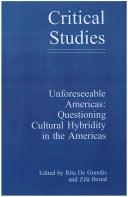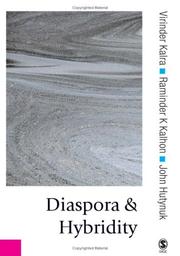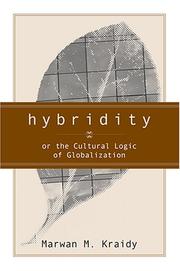| Listing 1 - 10 of 49 | << page >> |
Sort by
|
Book
Year: 2022 Publisher: Amsterdam Amsterdam University Press
Abstract | Keywords | Export | Availability | Bookmark
 Loading...
Loading...Choose an application
- Reference Manager
- EndNote
- RefWorks (Direct export to RefWorks)
Imitating models was the main early modern poetical principle. This study discusses Dutch novelistic prose translated from three European bestsellers: François de Bellesforest’s Histoires Tragiques (translation 1612), John Barclay’s Argenis (translations 1640-1681), and Antoine Torche’s Le Chien de Boulogne (translation 1681). Confirming Burke’s thesis of cultural hybridity the translations reflect balancing acts between accepting and resisting the contents and morals of their models. Only Torche’s Chien is transformed into a cultural translation, by adding a new Dutch narrative to its first chapters. Save this added Dutch narrative, all three bestsellers are translated docilely and accurately. This seems to indicate that novelistic prose served to make a profit, financing other commodities of the publishers. Nevertheless, at the same time translators Reinier Telle, Gerbrandt Bredero, Jan Glazemaker, and maybe Timotheus ten Hoorn, like canaries in coal mines, may have given their readers alarming signals on social behavior.
Book
ISBN: 3030891089 3030891097 Year: 2022 Publisher: Cham, Switzerland : Palgrave Macmillan,
Abstract | Keywords | Export | Availability | Bookmark
 Loading...
Loading...Choose an application
- Reference Manager
- EndNote
- RefWorks (Direct export to RefWorks)
Cultural fusion. --- Culture fusion --- Fusion, Cultural --- Hybridism (Social sciences) --- Hybridity (Social sciences) --- Cultural relations --- Acculturation --- Assimilation (Sociology) --- Ethnicity --- Multiculturalism --- Cultural pluralism --- Cultural hybridity --- Transculturalism --- Transculturation
Book
Year: 2022 Publisher: Amsterdam Amsterdam University Press
Abstract | Keywords | Export | Availability | Bookmark
 Loading...
Loading...Choose an application
- Reference Manager
- EndNote
- RefWorks (Direct export to RefWorks)
Imitating models was the main early modern poetical principle. This study discusses Dutch novelistic prose translated from three European bestsellers: François de Bellesforest’s Histoires Tragiques (translation 1612), John Barclay’s Argenis (translations 1640-1681), and Antoine Torche’s Le Chien de Boulogne (translation 1681). Confirming Burke’s thesis of cultural hybridity the translations reflect balancing acts between accepting and resisting the contents and morals of their models. Only Torche’s Chien is transformed into a cultural translation, by adding a new Dutch narrative to its first chapters. Save this added Dutch narrative, all three bestsellers are translated docilely and accurately. This seems to indicate that novelistic prose served to make a profit, financing other commodities of the publishers. Nevertheless, at the same time translators Reinier Telle, Gerbrandt Bredero, Jan Glazemaker, and maybe Timotheus ten Hoorn, like canaries in coal mines, may have given their readers alarming signals on social behavior.
Literary studies: c 1500 to c 1800 --- Early modern history: c 1450/1500 to c 1700 --- Netherlands --- Dutch --- c 1600 to c 1700 --- early modern novel; translations; cultural hybridity; publishers; Dutch Republic --- early modern novel; translations; cultural hybridity; publishers; Dutch Republic
Book
ISBN: 0809333163 9780809333165 9781306137997 1306137993 9780809333141 0809333147 Year: 2013 Publisher: Carbondale
Abstract | Keywords | Export | Availability | Bookmark
 Loading...
Loading...Choose an application
- Reference Manager
- EndNote
- RefWorks (Direct export to RefWorks)
Ethnicity --- Cultural fusion --- Ethnoarchaeology --- Material culture --- Culture fusion --- Fusion, Cultural --- Hybridism (Social sciences) --- Hybridity (Social sciences) --- Cultural relations --- Acculturation --- Assimilation (Sociology) --- Multiculturalism --- Cultural pluralism --- Culture --- Folklore --- Technology --- History --- Cultural hybridity --- Transculturalism --- Transculturation
Book
ISBN: 144384442X 9781443844420 1299659330 9781299659339 1443840289 9781443840286 Year: 2012 Publisher: Newcastle upon Tyne, UK Cambridge Scholars Publishing
Abstract | Keywords | Export | Availability | Bookmark
 Loading...
Loading...Choose an application
- Reference Manager
- EndNote
- RefWorks (Direct export to RefWorks)
In the last few decades, creolisation has become a recurrent feature in the works of scholars from many disciplines, serving as a useful metaphor for understanding contemporary societies in a ""world of globalisation"". More than a metaphor, creolisation ca
Cultural fusion --- Cultural relations. --- Cultural exchange --- Intercultural relations --- Intellectual cooperation --- International relations --- Culture fusion --- Fusion, Cultural --- Hybridism (Social sciences) --- Hybridity (Social sciences) --- Cultural relations --- Acculturation --- Assimilation (Sociology) --- Ethnicity --- Multiculturalism --- Cultural pluralism --- Europe --- Civilization --- African influences. --- Africa --- Cultural hybridity --- Transculturalism --- Transculturation

ISBN: 9042006684 9004333800 9789004333802 9789042006683 Year: 2000 Publisher: Amsterdam Rodopi
Abstract | Keywords | Export | Availability | Bookmark
 Loading...
Loading...Choose an application
- Reference Manager
- EndNote
- RefWorks (Direct export to RefWorks)
Sociology of culture --- America --- Cultural fusion --- Culture fusion --- Fusion, Cultural --- Hybridism (Social sciences) --- Hybridity (Social sciences) --- Cultural relations --- Acculturation --- Assimilation (Sociology) --- Ethnicity --- Multiculturalism --- Cultural pluralism --- Cultural hybridity --- Transculturalism --- Transculturation
Book
Year: 2022 Publisher: Amsterdam Amsterdam University Press
Abstract | Keywords | Export | Availability | Bookmark
 Loading...
Loading...Choose an application
- Reference Manager
- EndNote
- RefWorks (Direct export to RefWorks)
Imitating models was the main early modern poetical principle. This study discusses Dutch novelistic prose translated from three European bestsellers: François de Bellesforest’s Histoires Tragiques (translation 1612), John Barclay’s Argenis (translations 1640-1681), and Antoine Torche’s Le Chien de Boulogne (translation 1681). Confirming Burke’s thesis of cultural hybridity the translations reflect balancing acts between accepting and resisting the contents and morals of their models. Only Torche’s Chien is transformed into a cultural translation, by adding a new Dutch narrative to its first chapters. Save this added Dutch narrative, all three bestsellers are translated docilely and accurately. This seems to indicate that novelistic prose served to make a profit, financing other commodities of the publishers. Nevertheless, at the same time translators Reinier Telle, Gerbrandt Bredero, Jan Glazemaker, and maybe Timotheus ten Hoorn, like canaries in coal mines, may have given their readers alarming signals on social behavior.

ISBN: 0761973966 0761973974 1281251399 9786611251390 1847877303 1446226603 Year: 2005 Publisher: London Sage
Abstract | Keywords | Export | Availability | Bookmark
 Loading...
Loading...Choose an application
- Reference Manager
- EndNote
- RefWorks (Direct export to RefWorks)
The authors offer a critical assessment of the key literature on diaspora & hybridity, & how these concepts relate to the issues of social change & the pursuit of equality.
Migration. Refugees --- Social stratification --- Sociology of minorities --- Ethnicity. --- Cultural fusion. --- Emigration and immigration --- Human beings --- Culturele identiteit. --- Multiculturele samenlevingen. --- Diaspora. --- Social aspects. --- Migrations. --- Human geography --- Migrations of nations --- Culture fusion --- Fusion, Cultural --- Hybridism (Social sciences) --- Hybridity (Social sciences) --- Cultural relations --- Acculturation --- Assimilation (Sociology) --- Ethnicity --- Multiculturalism --- Cultural pluralism --- Ethnic identity --- Group identity --- Cultural fusion --- Cultural hybridity --- Transculturalism --- Transculturation
Book
ISBN: 2720214205 9782720214202 Year: 2001 Publisher: Paris Pauvert
Abstract | Keywords | Export | Availability | Bookmark
 Loading...
Loading...Choose an application
- Reference Manager
- EndNote
- RefWorks (Direct export to RefWorks)
Cultural fusion --- French --- 008 --- 316.7 --- Beschaving. Cultuur. Vooruitgang --- Cultuursociologie --(algemeen) --- 316.7 Cultuursociologie --(algemeen) --- 008 Beschaving. Cultuur. Vooruitgang --- Culture fusion --- Fusion, Cultural --- Hybridism (Social sciences) --- Hybridity (Social sciences) --- Cultural relations --- Acculturation --- Assimilation (Sociology) --- Ethnicity --- Multiculturalism --- Cultural pluralism --- Cultural fusion - Dictionaries - French --- Cultural hybridity --- Transculturalism --- Transculturation

ISBN: 1592131433 9786611093884 1281093882 159213145X 9781592131457 9781592131433 9781592131440 1592131441 Year: 2005 Publisher: Philadelphia : Temple University Press,
Abstract | Keywords | Export | Availability | Bookmark
 Loading...
Loading...Choose an application
- Reference Manager
- EndNote
- RefWorks (Direct export to RefWorks)
The intermingling of people and media from different cultures is a communication-based phenomenon known as hybridity. Drawing on original research from Lebanon to Mexico and analyzing the use of the term in cultural and postcolonial studies (as well as the popular and business media), Marwan Kraidy offers readers a history of the idea and a set of prescriptions for its future use.Kraidy analyzes the use of the concept of cultural mixture from the first century A.D. to its present application in the academy and the commercial press. The book's case studies build an argument for understanding th
Communication, International. --- Cultural fusion. --- Hybridity (Social sciences). --- Cultural fusion --- Communication, International --- Social Change --- Sociology & Social History --- Social Sciences --- International communication --- World communication --- Communication --- Culture fusion --- Fusion, Cultural --- Hybridism (Social sciences) --- Hybridity (Social sciences) --- Cultural relations --- Acculturation --- Assimilation (Sociology) --- Ethnicity --- Multiculturalism --- Cultural pluralism --- Fusion culturelle. --- Communication internationale. --- Society & culture: general --- Cultural hybridity --- Transculturalism --- Transculturation
| Listing 1 - 10 of 49 | << page >> |
Sort by
|

 Search
Search Feedback
Feedback About UniCat
About UniCat  Help
Help News
News